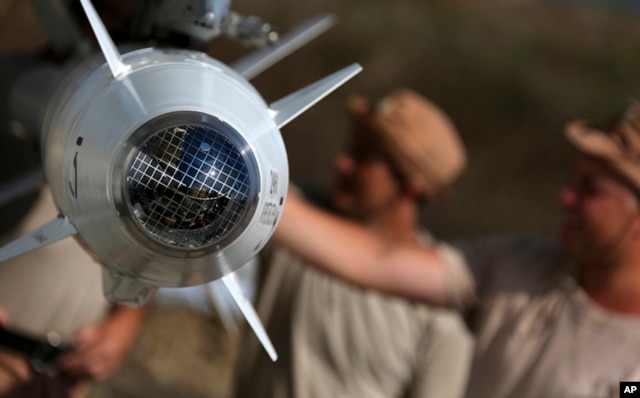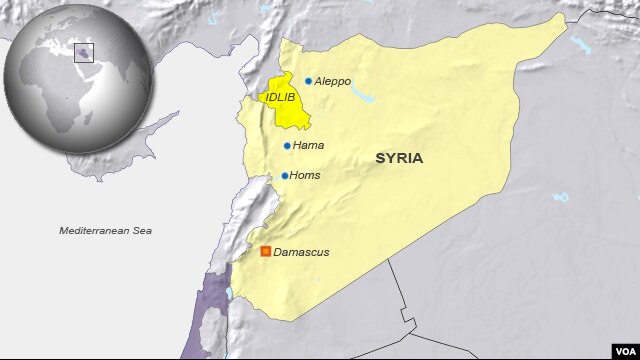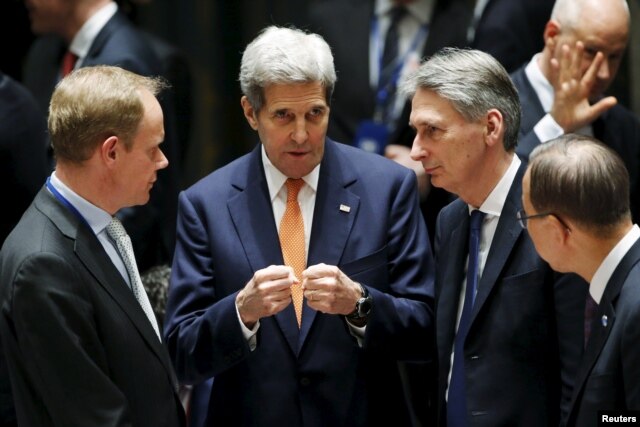
Amnesty: Russian Airstrikes Killed 200 Civilians in Syria
Last updated on: December 23, 2015
«Some Russian airstrikes appear to have directly attacked civilians or civilian objects by striking residential areas with no evident military target and even medical facilities, resulting in deaths and injuries to civilians,» Amnesty Middle East and North Africa Program Director Philip Luther said. «Such attacks may amount to war crimes.»
Amnesty also said it had evidence Russia used banned cluster munitions and unguided bombs. Moscow has not responded to the Amnesty report.
Syrian campaign
Russia launched a major military air campaign over Syria in late September as part of an effort to support President Bashar al-Assad. Russia has said it is targeting Islamic State, but it has faced widespread criticism that its strikes have focused largely on opposition group sites.
FILE In this photo taken from Russian Defense Ministry official web site on Tuesday, Oct. 6, 2015, Russian military support crew inspect missiles attached to their jet at an air base in Syria. at an air base Hmeimim in Syria.
Turkish Prime Minister Ahmet Davutoglu on Tuesday stepped up his criticism of Russia for targeting civilians sites and moderate opposition fighters. During a meeting with lawmakers, he condemned what he said were deadly Russian airstrikes Sunday in the rebel-held northwest city of Idlib.
Tensions between Russia and Turkey mounted late last month after Turkey shot down a Russian military jet that Ankara said had strayed into its territory near the Syrian border. Russia denies the charge.
Syrian opposition groups also blamed Russia for the strikes in Idlib, which they said killed more than 40 people, many of them civilians.
A separate U.S.-led coalition, which includes Turkey, has been targeting Islamic State targets in Iraq and Syria.
In reference to Russia’s alleged responsibility for Sunday’s deadly strikes in Idlib, a senior State Department official said it was not for the U.S. or the U.S. coalition to investigate claims of collateral damage by Russian aircraft.
“The Russians should speak to what they are doing, what they are hitting, what they are missing,” the official said.
‘Credible allegations’
The official added that U.S. authorities had evidence showing that some Russian airstrikes had not been “as precise” and had received “credible allegations” of Russian strikes hitting facilities such as hospitals and schools and killing or wounding innocent people.
“I assume that the Russians would not intentionally target a civilian site. That is a war crime,” said Daniel Serwer, a conflict management professor at the Johns Hopkins School of Advanced International Studies. He said, however, that Russia was less concerned about collateral damage in Syria.
“I think the long and short of it is that they just don’t worry as much about hitting civilians [in Syria] as Americans do,” Serwer said.
Although Russia and the United States are involved in separate air campaigns over Syria, both countries are part of the International Syria Support Group, which has been working to foster a political transition in Syria.
FILE – From left, British Ambassador to the U.N. Matthew Rycroft, U.S. Secretary of State John Kerry, Britain’s Foreign Secretary Philip Hammond, U.N. Secretary General Ban Ki-moon speak before a meeting of the U.N. Security Council in New York, Dec. 18, 2015.
Last Friday, the United Nations Security Council endorsed a plan by the group. It includes U.N.-mediated talks between the Syrian government and moderate opposition, a cease-fire, and the establishment of a transitional government followed by elections within 18 months.
Russian airstrikes, such as what may have occurred in Idlib, could slow this U.N.-led process, said Mark Katz, of George Mason University’s School of Policy, Government and International Affairs.
“If they are behind it or if they are even perceived to be behind it, then I think that other parties are going to question the seriousness of Russia’s commitment to the U.N. process,” Katz said.
Russia reaction
Last week, the Russian Defense Ministry addressed criticism about its air campaign in Syria.
In a statement last Wednesday, the Ministry said it had constantly faced criticism from «several representatives of the so-called ‘anti-ISIS coalition.’ »
It said, the more “precise” the Russian strikes, the more “clamor” had been observed in foreign mass media sources.
Chris Hannas contributed to this report from Washington




